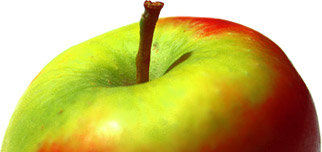I'm pretty sure our digs here in Monmouth Maine are on the site of an old orchard - that's why I've taken to calling it the "Wylde Orchard".
The property across the road from us is still an operating commercial orchard.
As I clear some paths / fire breaks around the property and check out the boundry lines I keep coming across old root stock hidden away in the jungle. I have no idea what variety they might have been or if they would produce any fruit if the forest overgrowth could be cleared around them. We could have some real antique varieties in there, as I suspect that one out by the road might be.
On that old tree out by the road we have a bunch of golden / pink "mystery apples" :
Those funny pink apples sure are tasty!
They look a little like Neighbor Ann's Pound Golden but smaller and more pink around the top.
I picked up one that had dropped - it was in pretty tough shape but fairly fresh:
After cutting out some bad spots, I cut it in half. It had very clear, white flesh with a very small seed case.
It was quite sweet and delicious; the flavor was sort of like a cross between a golden delicious and a pear.
Any idea what variety these might be?
One of my facebook contacts says it might be a "Grimes Golden" which is an antique variety from down South, originating around 1800. So what's it doing up here in Maine I wonder?
******************
I really love the idea of saving what we can of the heritage varieties that the commercial producers don't bother with any more. Hopefully we can "rescue" some more of the old root stocks that are lingering around our woods and see if we can get them to bear fruit again, or at least graft available scions from old varieties on to them. I loved learning how to graft from Mike and looking forward to doing a lot more of it next Spring.
We may start a living collection up here!
Jaque Clarke
194 Norris Hill Rd.
Monmouth, ME 04259
